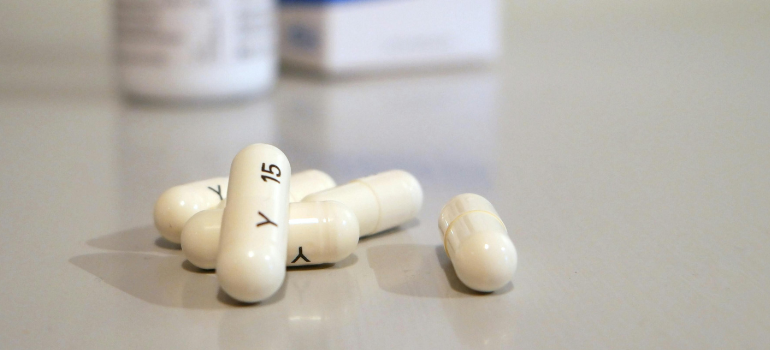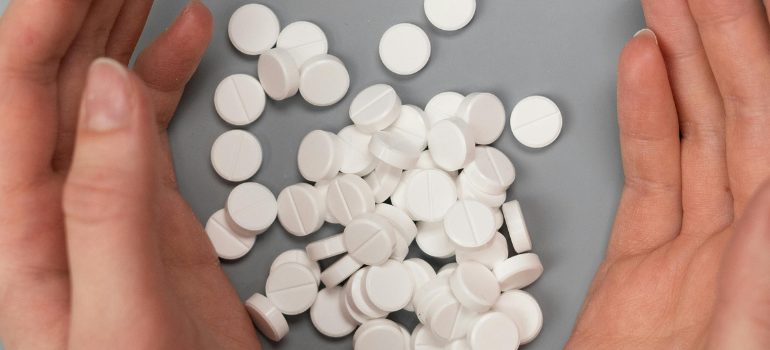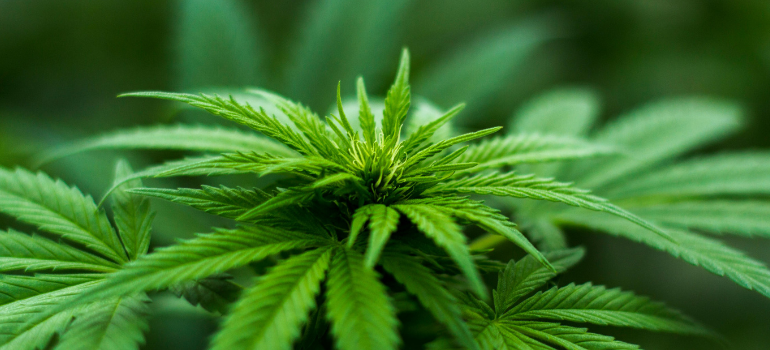While any addiction or substance use disorder can be highly distressing for the individual and those around them, some substances are much harder to quit than others. There is a variety of factors that contribute to the difficulty of stopping any given substance. This includes the chemical makeup of said substance, cultural discourse and behaviors around the substance, and other factors. However, which drugs are the hardest to quit?
Classification of Drugs and How This Impacts Which Drugs Are the Hardest to Quit
Drugs can be classified according to their chemical makeup as well as the effects they have on your brain and body.
- Opioids are a family of drugs that include hard drugs, such as meth and heroin, as well as prescription drugs used to treat physical pain, such as Tramadol.
- Benzodiazepines are a family of drugs prescribed by mental health professionals to treat anxiety disorders and anxiety symptoms, and they can sometimes be misused.
- Sedatives calm down your nervous system. They include alcohol and certain types of cannabis.
- Stimulants are drugs that activate your nervous system. These may be the preferred choice for people under a lot of stress. These include hard drugs, such as cocaine, and prescription drugs, such as Methylphenidate, used to treat ADHD.
- Nicotine, the name of the drug present in tobacco, can both relax and activate the nervous system.
Take any substance use disorders seriously. Remember that even a coffee addiction can be hard to nip in the bud. However, this is a rundown of eight drugs that are arguably the hardest to quit.

Heroin
Heroin is an opioid drug that is highly addictive. This is so because it acts very quickly, giving the person using it a feeling of euphoria. When under the influence of heroin, your body will soon convert heroin into morphine, which numbs all sorts of distress in your body. This generates dopamine.
Using heroin can, over time, rewire the reward center in your brain and change the neurotransmitter levels in your body. If used for an extended period, heroin can impact areas of the brain that have to do with decision-making, impulse control, and the ways your brain regulates stress.
Heroin generates physical dependence and tolerance. This means your body craves the substances in larger quantities as time passes. The physical effects of quitting heroin cold turkey can be pretty nasty and include:
- nausea and vomiting
- diarrhea
- muscle pain
- insomnia
- intense cravings
This drug has claimed as many as 9,173 lives in the United States in 2021. This accounts for as many as 75% of overdoses in the United States in said year. So heroin is not only highly addictive but also highly dangerous for West Virginians.
If you or a loved one is struggling with heroin use in West Virginia, they may qualify for MAT (Medically Assisted Treatment). MAT consists of medically administering certain drugs that can make withdrawal more gradual. Under MAT, the patient will experience less severe withdrawal symptoms. The patient is never in possession of large amounts of the drug. Professionals oversee treatment.
Please take into account that not all people with this substance use disorder may qualify for MAT. Also, MAT is not all there is to it when it comes to recovering from heroin addiction.
Once you are admitted into Harmony Ridge, you will start individual therapy, be considered for a dual diagnosis, and participate in alternative therapy besides receiving MAT to complete the detox process.

Crack Cocaine
Which drugs are the hardest to quit? This specific subtype of cocaine makes it to the list, no doubt. Crack cocaine, also known as “crack,” is a particular type of cocaine. It is different from cocaine because it has received an extra level of processing to become a crystalline rock.
Crack cocaine is a highly addictive substance because it has a rapid onset. This means it releases dopamine into the bloodstream very quickly. As we have discussed, dopamine affects the neurotransmitters in the brain’s reward system and drives the individual to repeat the behavior.
What’s tricky about crack cocaine is that its effect is of short duration. This drives the individual to use even more of the substance. Over time, this can create dependence and withdrawal far quicker than other drugs. This, in turn, accelerates the process of developing a substance use addiction. This is only made worse by the fact that those who use crack generally live in poverty and in environments where their social environment is all involved in using the drug, thus creating a never-ending vicious circle.
The withdrawal symptoms of crack cocaine include:
- anxiety
- depression
- intense cravings for the substance
- fatigue
- insomnia
If you or a loved one is using crack cocaine, seek a detox treatment near you immediately.

Nicotine
When one thinks of drugs that are difficult to quit, the first ones to come to mind are illegal substances like heroin or crack. Even though cigarettes are socially widespread and accepted, believe it or not, they are one of the hardest substances out there to quit.
You may think there are worse things to try out there than some tobacco. But if you have a diagnosis that makes you more prone to addiction, such as ADHD, anxiety, depression, BPD, or bipolar, think twice.
Since cigarettes are consumed socially and often paired with alcohol, a lot of patients end up suffering from both substance use disorders simultaneously. This can make it harder for the individual to quit both. Quitting two substances simultaneously can be overwhelming both physically and psychologically.
If you think you may be too dependent on nicotine and suspect there is a reason, such as a mental illness diagnosis or an existing one, listen up. At Harmony Ridge, we treat Substance Use holistically through dual diagnosis treatment for various mental illnesses. Said diagnoses may make it harder for you to quit cigarettes.

Alcohol
This is another surprising entry due to its popularity. However, the truth is that alcohol can be challenging to quit. This is especially so because it is so widely consumed and accepted. Unlike hard drugs, people in social settings may ask a lot of intrusive questions if you refuse a drink. They may even accuse you of not knowing how to have fun.
However, alcohol addiction destroys lives every day. It is estimated that as many as 14.5% of adults in West Virginia report binge drinking on at least one occasion in the last 30 days.
Alcohol is highly addictive because it directly impacts the reward system of the brain. It also releases endorphins, a hormone associated with well-being, and impacts GABA activation. GABA is an inhibitory neurotransmitter. It has a calming effect on the nervous system.
How do you know if you are having too much alcohol, though? You may want to quit your evening glasses of wine but cannot. Alcohol may be negatively impacting your relationships or work performance.
You may consider quitting if you end up doing dangerous activities like drunk driving or going places where there’s high criminal activity, like certain nightclubs, while intoxicated. For more information on whether you may need to consider a detox program in West Virginia, visit rehab for yourself at Harmony Ridges.

Benzodiazepines
Some examples of Benzodiazepines, commonly referred to as “benzos,” include Xanax, Clonazepam, Valium, and Diazepam. These are drugs with calming effects that psychiatrists prescribe for anxiety disorders and anxiety symptoms such as panic attacks. Some are sold illegally as recreational drugs. Even patients with a prescription can quickly end up abusing them. This is so due to a lack of proper education. Plus, the people who are prescribed Benzodiazepines are generally going through a vulnerable time to begin with.
The reasons why benzos are highly addictive are several. Some, like Xanax, have a quick onset. They very rapidly calm down your nervous system. They can give you a feeling of euphoria, and people who misuse them can quickly develop tolerance. Withdrawal from benzodiazepines can be pretty nasty, including symptoms such as
- anxiety and panic attacks
- insomnia
- seizures
- sweating
- loss of appetite
These withdrawal symptoms can be even worse than the anxiety symptoms that drove you to seek benzos in the first place. When you do decide to quit benzodiazepines, you generally need to do so under the supervision of medical professionals. This is so because other drugs are administered during detox to mitigate withdrawal symptoms.

Opioid Painkillers
When one thinks of which drugs are the hardest to quit, opium generally comes to mind. Opioid painkillers exist as both prescription drugs that can be misused and hard drugs such as meth. Prescription drugs of these types include
- Oxycodone
- Tramadol
- Fentanyl
- Codeine
- Morphine
- Hydrocodone
Both these prescription drugs and meth produce feelings of euphoria and sedation, as well as pain relief. Unfortunately, this makes them highly addictive, especially among senior citizens. This population is identified as one of the most vulnerable ones. This is so because, due to old age, they may require certain surgeries and treatments that require the use of strong painkillers that are later hard to quit.
Not only do opioids have nasty physical effects during withdrawal. They also have pretty damaging psychological effects. Some include depression, fatigue, and anxiety. In some extreme cases, people with opioid withdrawal symptoms can even experience psychosis.
Due to psychological dependence, most people find it incredibly challenging to quit opioids. The fact that they are present in prescription medication may even make a person who has never had an addiction before develop one accidentally. This is so because they take it during the rehabilitation of surgery and other taxing medical procedures, which are vulnerable times in a person’s life.

Cannabis
Even though this substance is perceived as a “soft” drug or at least relatively harmless when compared to hard drugs, social factors make it hard to quit cannabis. This is so because, among the younger generations, such as Gen Z, it is sometimes more socially acceptable to smoke, vape, or ingest cannabis than to drink alcohol.
So even though the chemical makeup of CBD is not that addictive, at least when in contrast to other substances we discussed in this article, one’s social environment can make it very hard to quit it.
Even though evidence of death, intoxication, and brain damage seems to favor cannabis over alcohol, one should be wary of this substance. This is so because it is an addictive substance like any other, and substance use disorder can risk your life and the well-being of your relationships. Marijuana is also considered a gateway drug to hardest substances to quit. So when we ask “which drugs are the hardest to quit”, we have to consider those that can get an individual started on multiple substances. And if all your friends are doing it, how do you expect to quit it if its consumption ever gets out of your hands?
All Substances Should Be Treated With Care
All substances require careful handling, but some are more addictive than others. When one ponders which drugs are the hardest to quit, some of the answers may surprise you. Many substances and behaviors are addictive. Some revolve around illegal substances like those known as “hard drugs” – heroin and crack cocaine are two notable examples.
Other highly addictive substances are legal substances. Generally, doctors prescribe them for various issues, such as the family of psychopharmaceuticals known as benzodiazepines. Opioid painkillers are another example of legal substances that are highly addictive. Finally, some substances that are hard to quit are widely spread and accepted by society as a whole, such as cigarettes, alcohol, and even cannabis. Other addictive substances and behaviors include coffee, tea, exercise, sex, gambling, shopping, and gaming. The degree to which a substance is hard to quit is influenced by both the chemical makeup of the substance and the social factors surrounding it.



